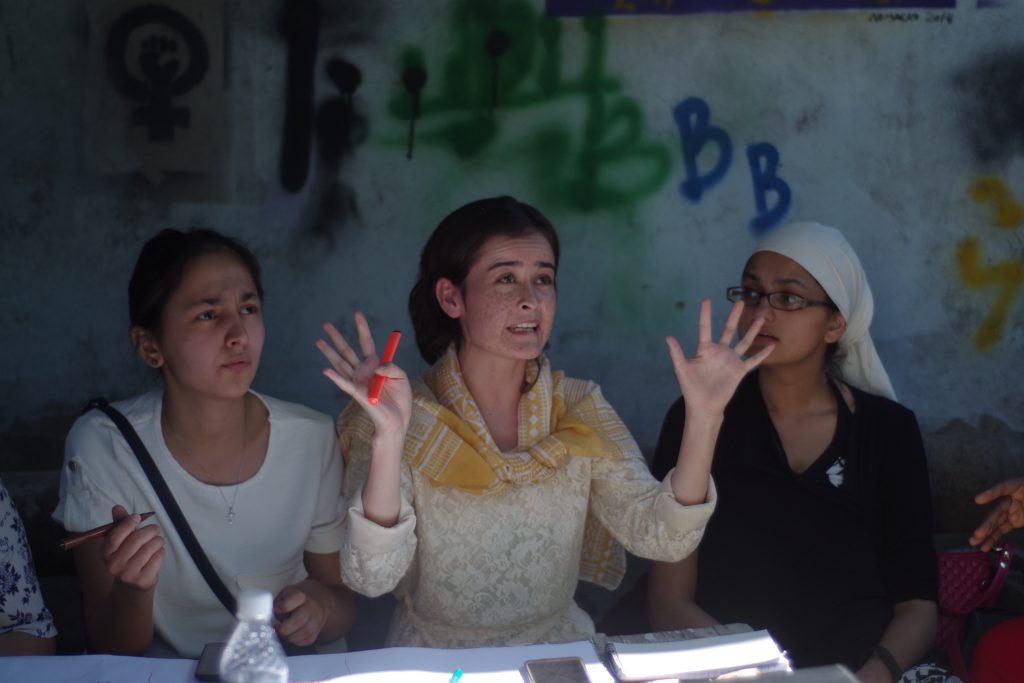During this year’s 9th Sexuality Institute in Bishkek, Kyrgyzstan, we held a 3-hour workshop on the use of Participatory Visual Methods for sexual & bodily rights research.
The workshop focused on “cellphilms”—i.e. the use of cell phones to make short 1 minute films–as a relatively accessible and dynamic tool that can be used by communities to document and advocate for change, particularly on sensitive & often taboo topics such as gender-based violence and trauma.
Exploring Participatory Visual Methods
Prior to the workshop, participants were provided background reading materials and case studies that would ground our opening conversations on some of the theoretical and ethical considerations around using visual methods for qualitative research, especially on gender-based violence.
Together we considered the advantages or limitations–in terms of accessibility, ease of use, sustainability, autonomy and community ownership–of various forms of information communication technologies (ICTs) that can be used to make films; the benefits of participatory methods in supporting & strengthening communities-led change; and strategic ways to use the outputs/visual products to advocate for social change and policy change.
From there participants dove straight in to a hands-on approach, exploring and practicing the method by creating films during the workshop.
With a dynamic group of over 20 participants from across 16 countries, there were quite a few topics people wanted to work on, including looking at restrictions on women’s sexual autonomy, narratives and conceptions around sexual pleasure, finding a common language on sexual & bodily rights issues.
Opening a Conversation on Rape
For one group, the key question was how can we open conversations about accountability, redress and support for survivors of rape?
The workshop proved to be a powerful forum for experience sharing on social responses to rape survivors across country and social contexts, from the level of individual experiences, to community organizing, to policy and law focused advocacy for change.
Synthesizing the key commonalities and considerations of the small group discussions, participants then collaboratively developed the prompts, storyboard, scripts and narratives of the cellphilms. The films were created using only a cellphone, the space of the workshop, and on the basis of a “no-editing required” / “one shot” take.
The first film, “Keep It Silent???”, documents all too common responses victims & survivors of rape experience when trying to reach out for help, which increase isolation, anxiety, shame, fear and stigma. The second film, “Break the Silence!”, moves the conversation towards proactive steps and possibilities for support.
A Resource for Awareness & Advocacy
After the workshop, we screened the films together–creating a forum for feedback and continued discussion about the process, content and opportunities for advocacy.
The two cellphilms that explored social responses to rape generated a lot of discussion amongst the audience.
Many participants affirmed they faced similar challenges to those highlighted in the films: from victim blaming, to the lack of accountability of first responders to treat rape survivors with dignity & respect, to a lack of trust between communities and law enforcement.
The films also introduced the importance of thinking of forms of social support and redress mechanisms beyond criminal law enforcement. Emotional support, psychological support, affirmation of the person’s experience, active listening, and accompaniment on the journey of recovery were all highlighted as perhaps often overlooked part of the conversations around how to respond to sexual assault and rape.
For those in the producing group, members also shared it was the first time they had been able to have a proactive discussion and actually create a narrative about support for survivors–a process that was affirming and cathartic.
The creators share the films here in the hopes they may be a resource for those seeking to have conversations about accountability, redress, and support for survivors of sexual assault and rape.




